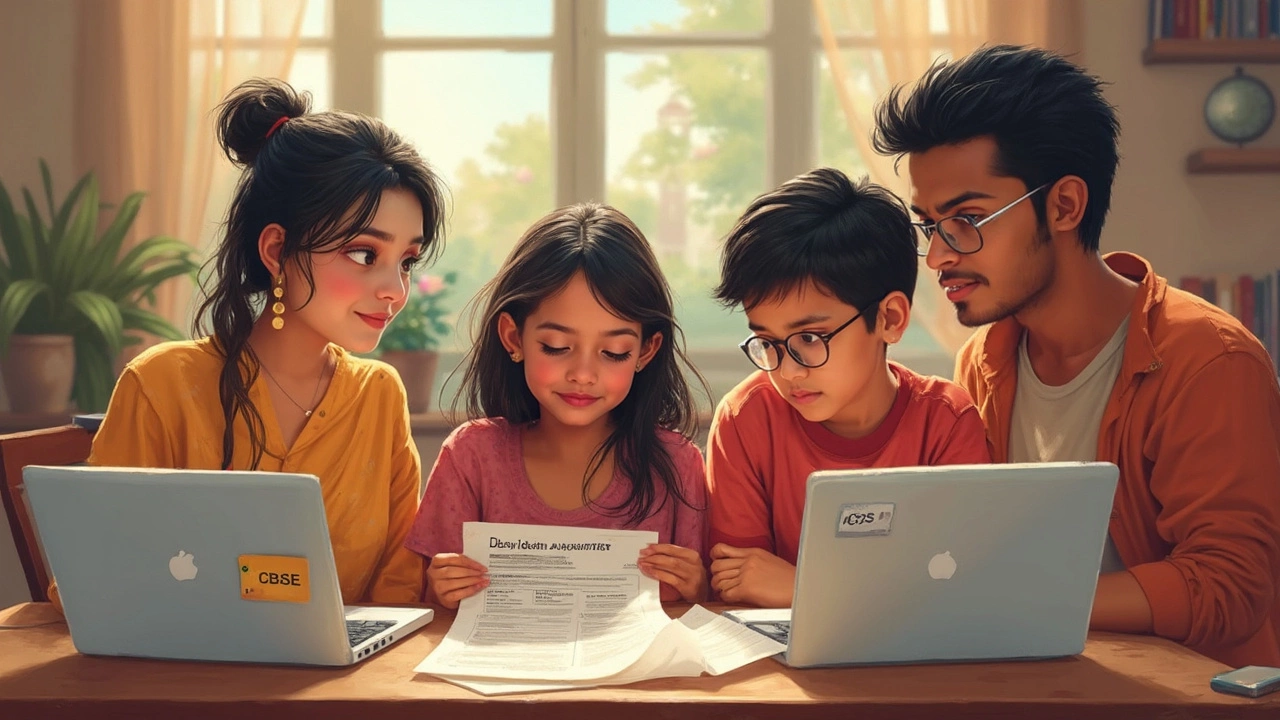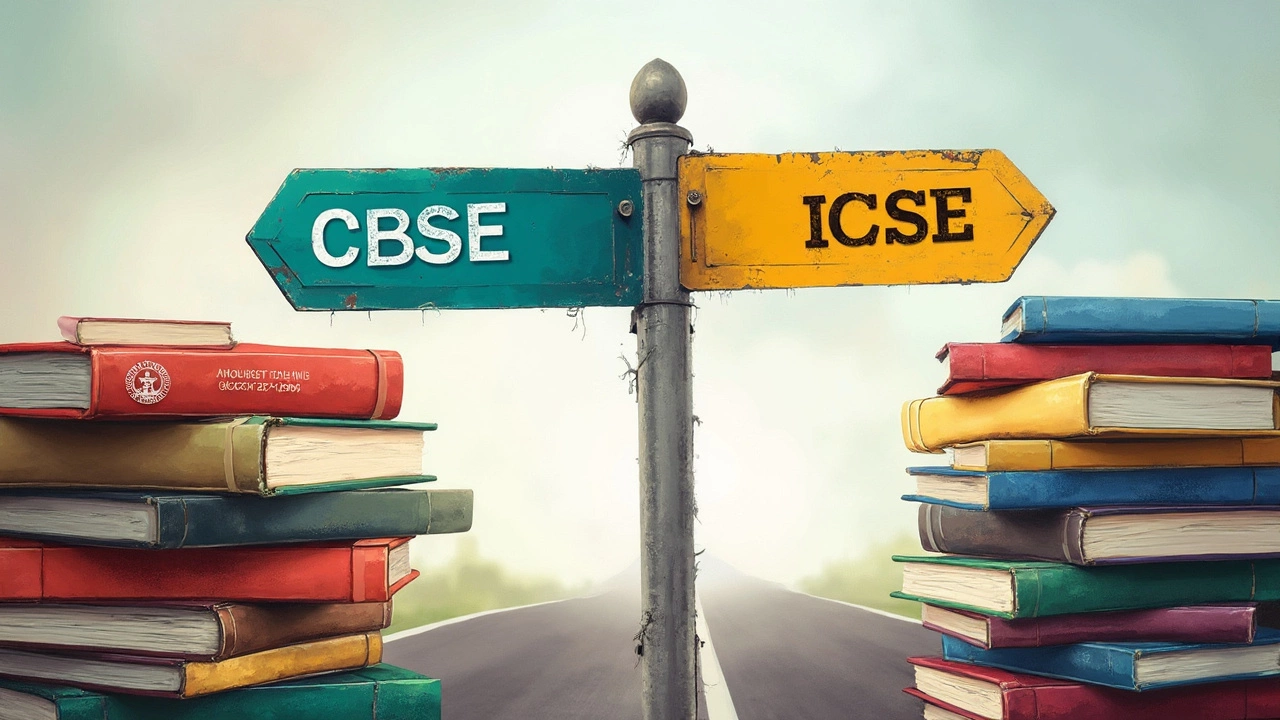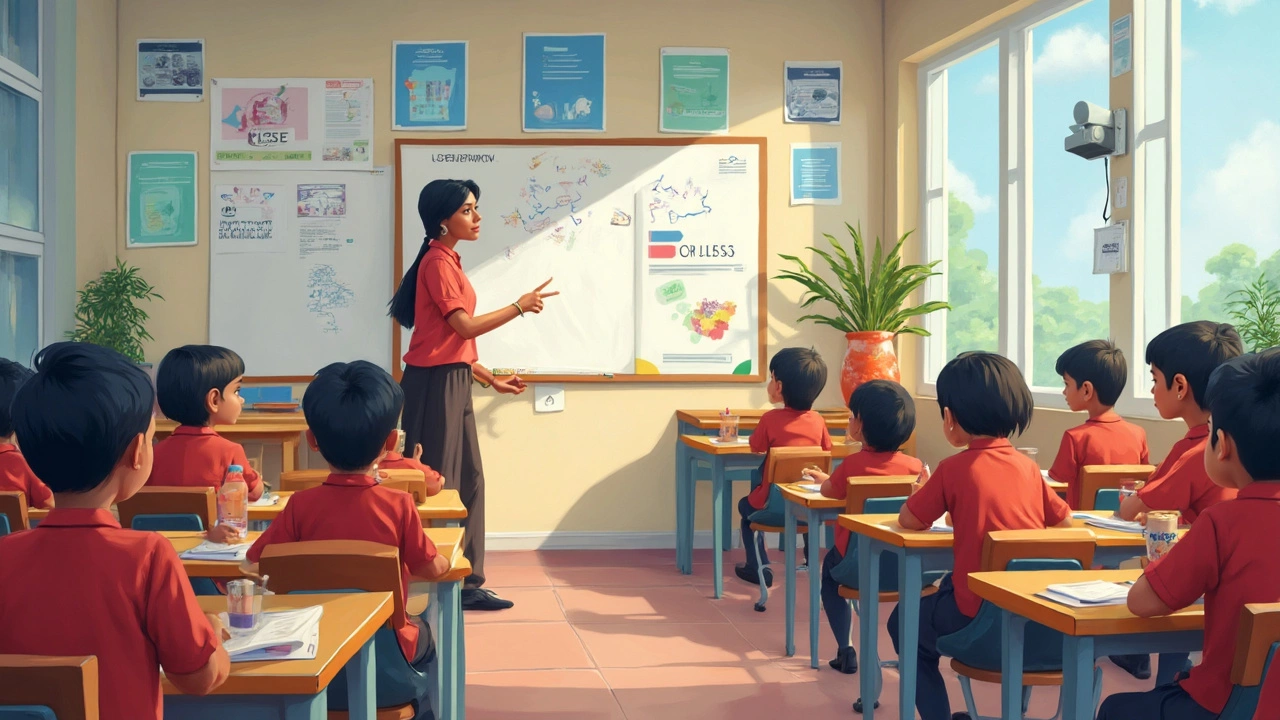Fact: Most people think all top Indian schools use the same board. They're wrong. Delhi Public School, or DPS, is almost always associated with the CBSE board. If you're searching for ICSE at DPS, you'll probably come up empty-handed. CBSE, which stands for Central Board of Secondary Education, is what you’ll see across the DPS network.
So, why does it matter? The board shapes what your kid studies, the style of exams, and even which competitive tests they’ll find easiest later on. Parents often get confused when picking between ICSE and CBSE, but knowing DPS’s tie-up clears up a lot. The next few sections break down the real differences, why DPS goes for CBSE, and how it all impacts your child.
- DPS Board Affiliation Explained
- CBSE and ICSE: What’s the Big Difference?
- Why DPS Prefers CBSE
- How It Matters for Your Child
- Choosing the Right Board: Tips for Parents
DPS Board Affiliation Explained
If you’re looking for a school that follows the CBSE syllabus, Delhi Public School (DPS) is one of the first names that comes up. Across India, nearly all DPS branches are officially linked to the Central Board of Secondary Education. When parents ask, “Is DPS ICSE or CBSE?” the answer is clear: DPS sticks with CBSE, not ICSE.
Each DPS branch needs to get formal recognition from the CBSE board. Usually, the school’s website and prospectus will say “Affiliated to CBSE, New Delhi” or mention their specific affiliation number. You won’t find this statement with ICSE for DPS schools.
Here’s what sets this apart:
- All major DPS campuses, from DPS R.K. Puram in Delhi to DPS Bangalore, run only the CBSE program.
- The study material, textbooks, and teaching methods follow CBSE guidelines.
- The pattern for board exams, grading, and results is exactly what you’ll see in any other CBSE school in the country.
There’s a rare exception—sometimes a DPS affiliate abroad might offer an international syllabus like IB or Cambridge, but you will not come across a DPS with ICSE in India.
This single affiliation makes life easier for families who often move cities or states. If you switch between DPS schools, the student will continue with the same curriculum, easing transitions and avoiding the stress of adjusting to a whole new board.
CBSE and ICSE: What’s the Big Difference?
You’ll run into two big names when searching for Indian school boards—CBSE and ICSE. Both are well-known, but what actually sets them apart?
CBSE (Central Board of Secondary Education) is a national board that covers tons of schools across the country, especially big chains like Delhi Public School. It’s recognized by the Government of India and aligns closely with national entrance exams like JEE and NEET. This means if your kid wants a shot at those exams, CBSE gives a direct path and sticks to a syllabus that matches what’s needed for those tests.
ICSE (Indian Certificate of Secondary Education), managed by the CISCE council, is a private board. It’s known for detailed, English-heavy coursework, and puts weight on arts, science, and practical knowledge. ICSE’s syllabus goes deep into subjects, which can get tricky if a student wants more time for sports or hobbies.
- CBSE: National focus, simpler syllabus, strong in science/math, more Hindi-medium schools, exam format designed for competitive tests.
- ICSE: Broader range of subjects, emphasis on English, detailed studies, lots of projects, recognized for strong language and application skills.
Here’s a quote from a popular education blog:
“CBSE is preferred for students aiming for competitive exams, while ICSE is suited for those wanting depth in languages and overall development.”
Parents should think about what fits best. CBSE keeps things straightforward, especially for those moving cities, since it’s so common. ICSE packs in more, but adds workload. Know these differences before picking a board for your child.

Why DPS Prefers CBSE
There’s a clear reason you see Delhi Public School (DPS) tied up with CBSE and not ICSE. For starters, CBSE is the most widely followed board in India. That makes things simpler if families transfer from one city to another. Parents don’t want hiccups with admissions or different syllabuses, and CBSE’s strong presence sorts that out.
DPS is big on prepping kids for top exams like JEE, NEET, and other national tests. These competitive exams use the CBSE syllabus as their base. So, sticking to CBSE actually lines up coursework with what’s asked in those major tests. It’s a practical move—no double work, no mismatched topics.
- CBSE’s exam pattern is straightforward. It focuses more on understanding concepts and less on memorizing. That suits DPS’s teaching style and what parents want: real learning over mugging up facts.
- CBSE is recognized by the Indian Government, which makes things hassle-free for further studies or moving between different states.
- Compared to ICSE, CBSE leans toward science and maths, while still covering languages and arts. DPS follows this since most students are aiming for engineering, medicine, or government careers.
If you want numbers, here’s something that puts it in perspective:
| Factor | CBSE (DPS Follows) | ICSE |
|---|---|---|
| Number of Schools (India, 2024) | 27,000+ | 2,600+ |
| Major Exam Alignment (JEE, NEET, etc) | Directly aligned | Partial overlap |
| Government Recognition | Full (central government board) | Private board |
| Easy Transfers | Yes, nationwide | Limited to metro cities |
DPS isn’t just following the crowd—it picks CBSE so students have a smooth journey from nursery till the end of school, and the options to jump anywhere in India without hassles.
How It Matters for Your Child
The main thing most parents want to know is: what difference does the Delhi Public School board make for my kid’s future? DPS’s choice of the CBSE board shapes almost everything, from classroom life to what your child faces after school is over.
CBSE’s curriculum is structured in a way that lines up closely with Indian national entrance exams, like JEE (for engineering) and NEET (for medicine). That’s not just marketing talk. About 75% of the JEE and NEET question styles now match what CBSE students see every day. Here’s a quick table to see how board choice impacts college entrance:
| Exam | % of CBSE Students Selected | Why CBSE Has Edge |
|---|---|---|
| JEE Main (2024) | ~66% | Syllabus overlaps, familiar question types |
| NEET (2024) | ~68% | NCERT textbooks used, direct curriculum match |
Besides entrance exams, CBSE schools tend to focus more on STEM (Science, Tech, Engineering, Maths) and scientific thinking. The teaching style is usually more activity-based and less on mugging up huge essays. If your kid plans to switch cities, CBSE also makes it easier—almost 28,000 schools in India and even a few abroad, all using the same syllabus. That’s a game-changer for families who move around.
There’s another point: the grading system. CBSE switched to a Continuous and Comprehensive Evaluation (CCE) method, which reduces student stress and tests more skills—from problem solving to teamwork—rather than just mega exams at year-end.
Every child is different, but if your family is aiming for national-level exams or needs flexibility to move cities, DPS’s CBSE link can make life a lot smoother. It blends standardization with opportunities for kids to shine in bigger arenas.

Choosing the Right Board: Tips for Parents
Picking between CBSE and ICSE is more than just a school logo. It’s about your child's learning style, your future plans, and what feels right for your family. Here’s how to make a decision you won’t regret:
First, think about your long-term plans. If there's a chance you'll move to another city or even outside India, the CBSE board is everywhere—over 25,000 schools are CBSE affiliated, making transfers a breeze. ICSE has fewer schools, mostly in metro cities.
| Factor | CBSE | ICSE |
|---|---|---|
| Number of Schools (India) | 25,000+ | 2,500+ |
| Focus | Application-based questions, Science & Math | Language and literature, Broad subjects |
| Popular Exams | JEE, NEET | Some fit for TOEFL, SAT, IELTS |
Here’s a simple checklist to make the process less stressful:
- Check if you want your child to focus on Science & Math. If yes, CBSE is usually better.
- If fluency in English and all-around subjects matter more, ICSE may work well.
- Ask current students or teachers at the school for real feedback about their daily life and study load.
- Look at past exam papers of both boards. See which one matches your child’s way of learning.
- Consider where your child might take entrance exams later. Most Indian competitive tests use the CBSE format.
- Remember, DPS almost always follows CBSE, so if your heart’s set on ICSE, you may need to look at other schools.
Truth is, no board is perfect. Both teach solid basics, but your family’s needs, not labels, should decide what works best. Talk it out, weigh each point, and choose what fits your child’s future goals.

Write a comment